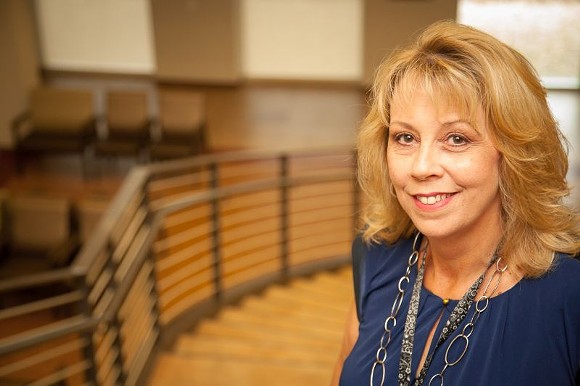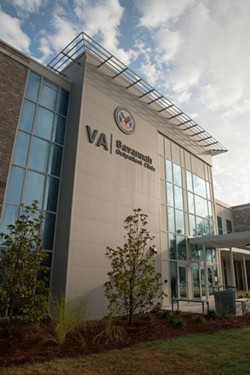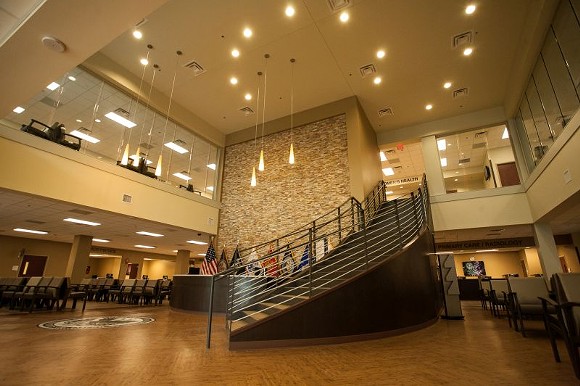WHILE health care for veterans in other parts of the country remains seriously compromised by long wait times and patient neglect, Major Jennifer Anderson has no complaints.
The 34 year-old former Black Hawk pilot and company commander sought help at Savannah’s VA clinic earlier this year for PTSD-related sleep issues and reports no trouble getting an appointment with a psychiatrist who provided more than just a prescription.
“I was extremely pleased with the care. It wasn’t just, ‘here’s some meds, see ya,’” says Maj. Anderson, who adds that she “felt like a robot” after three deployments to Iraq and Afghanistan.
“The doctor spent time with me, and really understood what vets go through. I never had to wait.”
That’s the kind of specialized attention that the staff of the Savannah VA Outpatient Clinic aims for and is anticipating more of as it moves to its new, state-of-the-art facility this week, just in time for Veteran’s Day.
The Savannah clinic is one of five community satellites of the Ralph H. Johnson Medical Center hospital in Charleston, SC, where veterans can receive a full range of care, from chemotherapy to heart surgery. The Savannah VA clinic has provided primary care for local veterans from a 34,000 square-foot space tucked off of Middleground Road for over 25 years, often referring patients often to the main office in Charleston for more complex procedures.

“We are offering so much more now,” said Nurse Manager Susan Robertson, her keys still sticking a bit as she unlocked the front door of the two-story, 56,000 square-foot shining edifice on Shawnee Road, just a half-mile away from the old clinic.
“The things people used to have to drive three hours for are going to be available right here, right away.”
Built from the ground up and walled with windows around an airy central atrium, the new clinic manages to feel grand without wasting an inch of space.
Cream-colored hallways lead to crisp, clean exam rooms and comfortable waiting areas, including a women-only section with dedicated gynecological and birth control services.
The patient flow is centralized around open work stations, where twelve primary care teams consisting of a doctor, a registered nurse (RN) and a licensed practical nurse (LPN) share information and collaborate on patient plans.
“Every time a veteran comes in, they see the same team. They have their own doctor, their own nurses. They don’t have to keep telling their story over and over to a different person every visit,” says Robertson.
“Plus, they get at least 30 minutes with their doctor, an hour for new appointments.”
Among the new machinery is a CT scanning machine, a spacious laboratory and a fully-equipped audiology department to address hearing loss due to detonation exposure, the most common health issue for veterans according to the VA.
The cardiology, pulmonary, prosthetics and physical therapy departments have been expanded, and for the first time, a full-time radiologist will be on staff to read X-rays and scans.
The new clinic also brings the concept of Telehealth to the forefront of care, allowing veterans to videoconference with specialists from the main office in Charleston, saving them the drive.
One thing that’s not new is a high level of communication between clinics. While the civilian medical community is still struggling with sharing records electronically, the VA has been doing it for years.
“The VA has actually led the way in computer technology,” says Robertson, nodding towards a row of monitors on rolling carts.
“A vet can be visiting from a different state and need to fill a prescription, and we can pull up their history immediately.”
Quality mental health care remains a high priority as PTSD and suicide rates among veterans continue to soar. Psychiatrists as well as social workers and peer support specialists are part of the team, and the Savannah clinic continues to treat local veterans for PTSD as part of its groundbreaking Prolonged Exposure/Setraline Study (PROGrESS). The research department is also expanding to offer treatment for Prolonged Grief Disorder, Military Sexual Trauma in addtition to PTSD and is currently enrolling patients who are interested in receiving treatment through those studies.
In spite of a report last month that the Department of Veterans Affairs doesn’t have the capacity to address the shocking disrespect to sick veterans that was exposed in 2014, the Savannah VA and its parent Ralph H. Johnson Medical Center are celebrated for its lower-than-average wait times and a high level of satisfaction among patients.
“We don’t really have those issues in Savannah,” says Robertson, who has been on staff since 2009. “We’ve had a four-to-five star rating as long as I’ve been here, and I hope it will be five-star consistently with this new facility and services.”
Maj. Anderson has health insurance through her current job,and says she sleeps pretty well these days. But she says she’ll continue to use the VA for mental health services and possibly other care now that she know she doesn’t have to drive to Charleston—and she plans to spread the word. She’s also the Senior Vice Commander at the VFW in Thunderbolt, where veterans of three generations gather every month for comradery and conversation.
Over 25,000 veterans from WWII, Vietnam, Operation Iraqi Freedom and Operation Enduring Freedom live in the Savannah area, but only about half of them use the VA.
“A lot of vets don’t seek treatment at the VA because they don’t know what’s available or they think they’re not going to be treated well,” says the former helicopter pilot with over 600 combat hours.
“This new clinic is really impressive and is going to make a big difference.”



